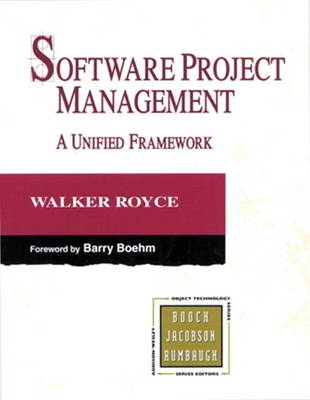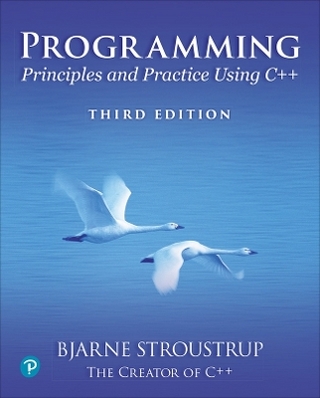
Software Project Management
Addison-Wesley Educational Publishers Inc (Verlag)
978-0-321-73402-0 (ISBN)
- Titel ist leider vergriffen;
keine Neuauflage - Artikel merken
This book provides a clear and provocative discussion of the economics, metrics, and management strategies needed to plan and execute a software project successfully. Royce discusses--with refreshing candor--some of the fads, follies, and excesses of the software industry, clearly differentiating proven techniques from obsolete methods. Paired with this insightful examination are compelling arguments for new management approaches that are sure to stimulate debate. The relative impacts of these new techniques are quantified through simple economic analyses, common sense, and anecdotal evidence. The resulting framework strikes a pragmatic balance between theory and practice that can be readily applied in today's challenging development environment. An extensive case study analysis of a large-scale, million-line project--deployed successfully on schedule and under budget using these techniques--further illustrates their application.
Software Project Management provides the software industry with field-proven benchmarks for making tactical decisions and strategic choices that will enhance an organization's probability of success. This book includes:
Top ten principles for modern software management
Strategies for smoothly transitioning an organization to modern processes and technologies (such as Rational's Unified process)
Methods for keeping software engineering teams motivated and effectively prioritized
Insight into the impacts of technology, people, and economics on managing a project
Metrics and forecasting guidance for project costs, schedules, and quality control
Walker Royce is a Vice President and General Manager at Rational Software Corporation. During the past two decades at Rational and TRW he has performed in roles ranging from coder, designer, integrator, cost estimator, and trainer to software architect, project manager, product manager, R&D manager, technical fellow, and principal consultant.
List of Figures.
List of Tables.
Foreword.
Preface.
I. SOFTWARE MANAGEMENT RENAISSANCE.
1. Conventional Software Management.
The Waterfall Model.
In Theory.
In Practice.
Conventional Software Management Performance.
2. Evolution of Software Economics.
Software Economics.
Pragmatic Software Cost Estimation.
3. Improving Software Economics.
Reducing Software Product Size.
Languages.
Object-Oriented Methods and Visual Modeling.
Reuse.
Commercial Components.
Improving Software Processes.
Improving Team Effectiveness.
Improving Automation through Software Environments.
Achieving Required Quality.
Peer Inspections: A Pragmatic View.
4. The Old Way and the New.
The Principles of Conventional Software Engineering.
The Principles of Modern Software Management.
Transitioning to an Iterative Process.
II. A SOFTWARE MANAGEMENT PROCESS FRAMEWORK.
5. Life-Cycle Phases.
Engineering and Production Stages.
Inception Phase.
Elaboration Phase.
Construction Phase.
Transition Phase.
6. Artifacts of the Process.
The Artifact Sets.
The Management Set.
The Engineering Sets.
Artifact Evolution over the Life Cycle.
Test Artifacts.
Management Artifacts.
Engineering Artifacts.
Pragmatic Artifacts.
7. Model-Based Software Architectures.
Architecture: A Management Perspective.
Architecture: A Technical Perspective.
8. Workflows of the Process.
Software Process Workflows.
Iteration Workflows.
9. Checkpoints of the Process.
Major Milestones.
Minor Milestones.
Periodic Status Assessments.
III. SOFTWARE MANAGEMENT DISCIPLINES.
10. Iterative Process Planning.
Work Breakdown Structures.
Conventional WBS Issues.
Evolutionary Work Breakdown Structures.
Planning Guidelines.
The Cost and Schedule Estimating Process.
The Iteration Planning Process.
Pragmatic Planning.
11. Project Organizations and Responsibilities.
Line-of-Business Organizations.
Project Organizations.
Evolution of Organizations.
12. Process Automation.
Tools: Automation Building Blocks.
The Project Environment.
Round-Trip Engineering.
Change Management.
Infrastructures.
Stakeholder Environments.
13. Project Control and Process Instrumentation.
The Seven Core Metrics.
Management Indicators.
Work and Progress.
Budgeted Cost and Expenditures.
Staffing and Team Dynamics.
Quality Indicators.
Change Traffic and Stability.
Breakage and Modularity.
Rework and Adaptability.
MTBF and Maturity.
Life-Cycle Expectations.
Pragmatic Software Metrics.
Metrics Automation.
14. Tailoring the Process.
Process Discriminants.
Scale.
Stakeholder Cohesion or Contention.
Process Flexibility or Rigor.
Process Maturity.
Architectural Risk.
Domain Experience.
Example: Small-Scale Project versus Large-Scale Project.
IV. LOOKING FORWARD.
15. Modern Project Profiles.
Continuous Integration.
Early Risk Resolution.
Evolutionary Requirements.
Teamwork among Stakeholders.
Top 10 Software Management Principles.
Software Management Best Practices.
16. Next-Generation Software Economics.
Next-Generation Cost Models.
Modern Software Economics.
17. Modern Process Transitions.
Culture Shifts.
Denouement.
V. CASE STUDIES AND BACKUP MATERIAL.
Appendix A. The State of the Practice in Software Management.
Appendix B. The COCOMO Cost Estimation Model.
COCOMO.
Ada COCOMO.
COCOMO II.
Appendix C. Change Metrics.
Overview.
Metrics Derivation.
Collected Statistics.
End-Product Quality Metrics.
In-Progress Indicators.
Pragmatic Change Metrics.
Appendix D. CCPDS-R Case Study.
Context for the Case Study.
Common Subsystem Overview.
Project Organization.
Common Subsystem Product Overview.
Process Overview.
Risk Management: Build Content.
The Incremental Design Process.
Component Evolution.
The Incremental Test Process.
DOD-STD-2167A Artifacts.
Demonstration-Based Assessment.
Core Metrics.
Development Progress.
Test Progress.
Stability.
Modularity.
Adaptability.
Maturity.
Cost/Effort Expenditures by Activity.
Other Metrics.
Software Size Evolution.
Subsystem Process Improvements.
SCO Resolution Profile.
CSCI Productivities and Quality Factors.
People Factors.
Core Team.
Award Fee Flowdown Plan.
Conclusions.
Appendix E. Process Improvement and Mapping to the CMM.
CMM Overview.
Pragmatic Process Improvement.
Maturity Questionnaire.
Questions Not Asked by the Maturity Questionnaire.
Overall Process Assessment.
Glossary.
References.
Index.
| Erscheint lt. Verlag | 15.3.2011 |
|---|---|
| Verlagsort | New Jersey |
| Sprache | englisch |
| Maße | 185 x 231 mm |
| Gewicht | 726 g |
| Themenwelt | Informatik ► Software Entwicklung ► Objektorientierung |
| Mathematik / Informatik ► Informatik ► Theorie / Studium | |
| ISBN-10 | 0-321-73402-5 / 0321734025 |
| ISBN-13 | 978-0-321-73402-0 / 9780321734020 |
| Zustand | Neuware |
| Informationen gemäß Produktsicherheitsverordnung (GPSR) | |
| Haben Sie eine Frage zum Produkt? |
aus dem Bereich


